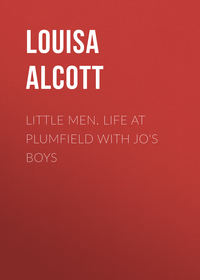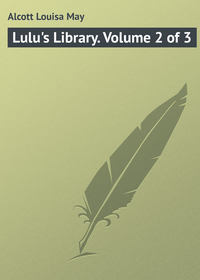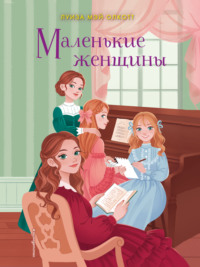 полная версия
полная версияLittle Women: or, Meg, Jo, Beth, and Amy
"'Now then, mum?'
"I gave my order as soberly as I could, and slamming down the door, with an 'Aye, aye, mum,' the man made his horse walk, as if going to a funeral. I poked again, and said, 'A little faster;' then off he went, helter-skelter, as before, and we resigned ourselves to our fate.
"To-day was fair and we went to Hyde Park, close by, for we are more aristocratic than we look. The Duke of Devonshire lives near. I often see his footmen lounging at the back gate; and the Duke of Wellington's house is not far off. Such sights as I saw, my dear! It was as good as Punch, for there were fat dowagers rolling about in their red and yellow coaches, with gorgeous Jeameses in silk stockings and velvet coats, up behind, and powdered coachmen in front. Smart maids, with the rosiest children I ever saw; handsome girls, looking half asleep; dandies, in queer English hats and lavender kids, lounging about, and tall soldiers, in short red jackets and muffin caps stuck on one side, looking so funny I longed to sketch them.
"Rotten Row means 'Route de Roi,' or the king's way; but now it's more like a riding-school than anything else. The horses are splendid, and the men, especially the grooms, ride well; but the women are stiff, and bounce, which isn't according to our rules. I longed to show them a tearing American gallop, for they trotted solemnly up and down, in their scant habits and high hats, looking like the women in a toy Noah's Ark. Every one rides, – old men, stout ladies, little children, – and the young folks do a deal of flirting here; I saw a pair exchange rosebuds, for it's the thing to wear one in the button-hole, and I thought it rather a nice little idea.
"In the p. m. to Westminster Abbey; but don't expect me to describe it, that's impossible – so I'll only say it was sublime! This evening we are going to see Fechter, which will be an appropriate end to the happiest day of my life.
"Midnight."It's very late, but I can't let my letter go in the morning without telling you what happened last evening. Who do you think came in, as we were at tea? Laurie's English friends, Fred and Frank Vaughn! I was so surprised, for I shouldn't have known them but for the cards. Both are tall fellows, with whiskers; Fred handsome in the English style, and Frank much better, for he only limps slightly, and uses no crutches. They had heard from Laurie where we were to be, and came to ask us to their house; but uncle won't go, so we shall return the call, and see them as we can. They went to the theatre with us, and we did have such a good time, for Frank devoted himself to Flo, and Fred and I talked over past, present, and future fun as if we had known each other all our days. Tell Beth Frank asked for her, and was sorry to hear of her ill health. Fred laughed when I spoke of Jo, and sent his 'respectful compliments to the big hat.' Neither of them had forgotten Camp Laurence, or the fun we had there. What ages ago it seems, doesn't it?
"Aunt is tapping on the wall for the third time, so I must stop. I really feel like a dissipated London fine lady, writing here so late, with my room full of pretty things, and my head a jumble of parks, theatres, new gowns, and gallant creatures who say 'Ah!' and twirl their blond mustaches with the true English lordliness. I long to see you all, and in spite of my nonsense am, as ever, your loving
Amy.""Dear Girls, – "Paris.
"In my last I told you about our London visit, – how kind the Vaughns were, and what pleasant parties they made for us. I enjoyed the trips to Hampton Court and the Kensington Museum more than anything else, – for at Hampton I saw Raphael's cartoons, and, at the Museum, rooms full of pictures by Turner, Lawrence, Reynolds, Hogarth, and the other great creatures. The day in Richmond Park was charming, for we had a regular English picnic, and I had more splendid oaks and groups of deer than I could copy; also heard a nightingale, and saw larks go up. We 'did' London to our hearts' content, thanks to Fred and Frank, and were sorry to go away; for, though English people are slow to take you in, when they once make up their minds to do it they cannot be outdone in hospitality, I think. The Vaughns hope to meet us in Rome next winter, and I shall be dreadfully disappointed if they don't, for Grace and I are great friends, and the boys very nice fellows, – especially Fred.
"Well, we were hardly settled here, when he turned up again, saying he had come for a holiday, and was going to Switzerland. Aunt looked sober at first, but he was so cool about it she couldn't say a word; and now we get on nicely, and are very glad he came, for he speaks French like a native, and I don't know what we should do without him. Uncle doesn't know ten words, and insists on talking English very loud, as if that would make people understand him. Aunt's pronunciation is old-fashioned, and Flo and I, though we flattered ourselves that we knew a good deal, find we don't, and are very grateful to have Fred do the 'parley vooing,' as uncle calls it.
"Such delightful times as we are having! sight-seeing from morning till night, stopping for nice lunches in the gay cafés, and meeting with all sorts of droll adventures. Rainy days I spend in the Louvre, revelling in pictures. Jo would turn up her naughty nose at some of the finest, because she has no soul for art; but I have, and I'm cultivating eye and taste as fast as I can. She would like the relics of great people better, for I've seen her Napoleon's cocked hat and gray coat, his baby's cradle and his old toothbrush; also Marie Antoinette's little shoe, the ring of Saint Denis, Charlemagne's sword, and many other interesting things. I'll talk for hours about them when I come, but haven't time to write.
"The Palais Royale is a heavenly place, – so full of bijouterie and lovely things that I'm nearly distracted because I can't buy them. Fred wanted to get me some, but of course I didn't allow it. Then the Bois and the Champs Elysées are très magnifique. I've seen the imperial family several times, – the emperor an ugly, hard-looking man, the empress pale and pretty, but dressed in bad taste, I thought, – purple dress, green hat, and yellow gloves. Little Nap. is a handsome boy, who sits chatting to his tutor, and kisses his hand to the people as he passes in his four-horse barouche, with postilions in red satin jackets, and a mounted guard before and behind.
"We often walk in the Tuileries Gardens, for they are lovely, though the antique Luxembourg Gardens suit me better. Père la Chaise is very curious, for many of the tombs are like small rooms, and, looking in, one sees a table, with images or pictures of the dead, and chairs for the mourners to sit in when they come to lament. That is so Frenchy.
"Our rooms are on the Rue de Rivoli, and, sitting in the balcony, we look up and down the long, brilliant street. It is so pleasant that we spend our evenings talking there, when too tired with our day's work to go out. Fred is very entertaining, and is altogether the most agreeable young man I ever knew, – except Laurie, whose manners are more charming. I wish Fred was dark, for I don't fancy light men; however, the Vaughns are very rich, and come of an excellent family, so I won't find fault with their yellow hair, as my own is yellower.
"Next week we are off to Germany and Switzerland; and, as we shall travel fast, I shall only be able to give you hasty letters. I keep my diary, and try to 'remember correctly and describe clearly all that I see and admire,' as father advised. It is good practice for me, and, with my sketch-book, will give you a better idea of my tour than these scribbles.
"Adieu; I embrace you tenderly. Votre Amie."
"My dear Mamma, – "Heidelberg.
"Having a quiet hour before we leave for Berne, I'll try to tell you what has happened, for some of it is very important, as you will see.
"The sail up the Rhine was perfect, and I just sat and enjoyed it with all my might. Get father's old guide-books, and read about it; I haven't words beautiful enough to describe it. At Coblentz we had a lovely time, for some students from Bonn, with whom Fred got acquainted on the boat, gave us a serenade. It was a moonlight night, and, about one o'clock, Flo and I were waked by the most delicious music under our windows. We flew up, and hid behind the curtains; but sly peeps showed us Fred and the students singing away down below. It was the most romantic thing I ever saw, – the river, the bridge of boats, the great fortress opposite, moonlight everywhere, and music fit to melt a heart of stone.
"When they were done we threw down some flowers, and saw them scramble for them, kiss their hands to the invisible ladies, and go laughing away, – to smoke and drink beer, I suppose. Next morning Fred showed me one of the crumpled flowers in his vest-pocket, and looked very sentimental. I laughed at him, and said I didn't throw it, but Flo, which seemed to disgust him, for he tossed it out of the window, and turned sensible again. I'm afraid I'm going to have trouble with that boy, it begins to look like it.
"The baths at Nassau were very gay, so was Baden-Baden, where Fred lost some money, and I scolded him. He needs some one to look after him when Frank is not with him. Kate said once she hoped he'd marry soon, and I quite agree with her that it would be well for him. Frankfort was delightful; I saw Goethe's house, Schiller's statue, and Dannecker's famous 'Ariadne.' It was very lovely, but I should have enjoyed it more if I had known the story better. I didn't like to ask, as every one knew it, or pretended they did. I wish Jo would tell me all about it; I ought to have read more, for I find I don't know anything, and it mortifies me.
"Now comes the serious part, – for it happened here, and Fred is just gone. He has been so kind and jolly that we all got quite fond of him; I never thought of anything but a travelling friendship, till the serenade night. Since then I've begun to feel that the moonlight walks, balcony talks, and daily adventures were something more to him than fun. I haven't flirted, mother, truly, but remembered what you said to me, and have done my very best. I can't help it if people like me; I don't try to make them, and it worries me if I don't care for them, though Jo says I haven't got any heart. Now I know mother will shake her head, and the girls say, 'Oh, the mercenary little wretch!' but I've made up my mind, and, if Fred asks me, I shall accept him, though I'm not madly in love. I like him, and we get on comfortably together. He is handsome, young, clever enough, and very rich, – ever so much richer than the Laurences. I don't think his family would object, and I should be very happy, for they are all kind, well-bred, generous people, and they like me. Fred, as the eldest twin, will have the estate, I suppose, and such a splendid one as it is! A city house in a fashionable street, not so showy as our big houses, but twice as comfortable, and full of solid luxury, such as English people believe in. I like it, for it's genuine. I've seen the plate, the family jewels, the old servants, and pictures of the country place, with its park, great house, lovely grounds, and fine horses. Oh, it would be all I should ask! and I'd rather have it than any title such as girls snap up so readily, and find nothing behind. I may be mercenary, but I hate poverty, and don't mean to bear it a minute longer than I can help. One of us must marry well; Meg didn't, Jo won't, Beth can't yet, so I shall, and make everything cosey all round. I wouldn't marry a man I hated or despised. You may be sure of that; and, though Fred is not my model hero, he does very well, and, in time, I should get fond enough of him if he was very fond of me, and let me do just as I liked. So I've been turning the matter over in my mind the last week, for it was impossible to help seeing that Fred liked me. He said nothing, but little things showed it; he never goes with Flo, always gets on my side of the carriage, table, or promenade, looks sentimental when we are alone, and frowns at any one else who ventures to speak to me. Yesterday, at dinner, when an Austrian officer stared at us, and then said something to his friend, – a rakish-looking baron, – about 'ein wonderschönes Blöndchen,' Fred looked as fierce as a lion, and cut his meat so savagely, it nearly flew off his plate. He isn't one of the cool, stiff Englishmen, but is rather peppery, for he has Scotch blood in him, as one might guess from his bonnie blue eyes.
"Well, last evening we went up to the castle about sunset, – at least all of us but Fred, who was to meet us there, after going to the Post Restante for letters. We had a charming time poking about the ruins, the vaults where the monster tun is, and the beautiful gardens made by the elector, long ago, for his English wife. I liked the great terrace best, for the view was divine; so, while the rest went to see the rooms inside, I sat there trying to sketch the gray stone lion's head on the wall, with scarlet woodbine sprays hanging round it. I felt as if I'd got into a romance, sitting there, watching the Neckar rolling through the valley, listening to the music of the Austrian band below, and waiting for my lover, like a real story-book girl. I had a feeling that something was going to happen, and I was ready for it. I didn't feel blushy or quakey, but quite cool, and only a little excited.
"By and by I heard Fred's voice, and then he came hurrying through the great arch to find me. He looked so troubled that I forgot all about myself, and asked what the matter was. He said he'd just got a letter begging him to come home, for Frank was very ill; so he was going at once, in the night train, and only had time to say good-by. I was very sorry for him, and disappointed for myself, but only for a minute, because he said, as he shook hands, – and said it in a way that I could not mistake, – 'I shall soon come back; you won't forget me, Amy?'
"I didn't promise, but I looked at him, and he seemed satisfied, and there was no time for anything but messages and good-byes, for he was off in an hour, and we all miss him very much. I know he wanted to speak, but I think, from something he once hinted, that he had promised his father not to do anything of the sort yet awhile, for he is a rash boy, and the old gentleman dreads a foreign daughter-in-law. We shall soon meet in Rome; and then, if I don't change my mind, I'll say 'Yes, thank you,' when he says 'Will you, please?'
"Of course this is all very private, but I wished you to know what was going on. Don't be anxious about me; remember I am your 'prudent Amy,' and be sure I will do nothing rashly. Send me as much advice as you like; I'll use it if I can. I wish I could see you for a good talk, Marmee. Love and trust me.
"Ever your Amy."
XXXII
TENDER TROUBLES
"Jo, I'm anxious about Beth."
"Why, mother, she has seemed unusually well since the babies came."
"It's not her health that troubles me now; it's her spirits. I'm sure there is something on her mind, and I want you to discover what it is."
"What makes you think so, mother?"
"She sits alone a good deal, and doesn't talk to her father as much as she used. I found her crying over the babies the other day. When she sings, the songs are always sad ones, and now and then I see a look in her face that I don't understand. This isn't like Beth, and it worries me."
"Have you asked her about it?"
"I have tried once or twice; but she either evaded my questions, or looked so distressed that I stopped. I never force my children's confidence, and I seldom have to wait for it long."
Mrs. March glanced at Jo as she spoke, but the face opposite seemed quite unconscious of any secret disquietude but Beth's; and, after sewing thoughtfully for a minute, Jo said, —
"I think she is growing up, and so begins to dream dreams, and have hopes and fears and fidgets, without knowing why, or being able to explain them. Why, mother, Beth's eighteen, but we don't realize it, and treat her like a child, forgetting she's a woman."
"So she is. Dear heart, how fast you do grow up," returned her mother, with a sigh and a smile.
" Can't be helped, Marmee, so you must resign yourself to all sorts of worries, and let your birds hop out of the nest, one by one. I promise never to hop very far, if that is any comfort to you."
"It is a great comfort, Jo; I always feel strong when you are at home, now Meg is gone. Beth is too feeble and Amy too young to depend upon; but when the tug comes, you are always ready."
"Why, you know I don't mind hard jobs much, and there must always be one scrub in a family. Amy is splendid in fine works, and I'm not; but I feel in my element when all the carpets are to be taken up, or half the family fall sick at once. Amy is distinguishing herself abroad; but if anything is amiss at home, I'm your man."
"I leave Beth to your hands, then, for she will open her tender little heart to her Jo sooner than to any one else. Be very kind, and don't let her think any one watches or talks about her. If she only would get quite strong and cheerful again, I shouldn't have a wish in the world."
"Happy woman! I've got heaps."
"My dear, what are they?"
"I'll settle Bethy's troubles, and then I'll tell you mine. They are not very wearing, so they'll keep;" and Jo stitched away, with a wise nod which set her mother's heart at rest about her, for the present at least.
While apparently absorbed in her own affairs, Jo watched Beth; and, after many conflicting conjectures, finally settled upon one which seemed to explain the change in her. A slight incident gave Jo the clue to the mystery, she thought, and lively fancy, loving heart did the rest. She was affecting to write busily one Saturday afternoon, when she and Beth were alone together; yet as she scribbled, she kept her eye on her sister, who seemed unusually quiet. Sitting at the window, Beth's work often dropped into her lap, and she leaned her head upon her hand, in a dejected attitude, while her eyes rested on the dull, autumnal landscape. Suddenly some one passed below, whistling like an operatic blackbird, and a voice called out, —
"All serene! Coming in to-night."
Beth started, leaned forward, smiled and nodded, watched the passer-by till his quick tramp died away, then said softly, as if to herself, —
"How strong and well and happy that dear boy looks."
"Hum!" said Jo, still intent upon her sister's face; for the bright color faded as quickly as it came, the smile vanished, and presently a tear lay shining on the window-ledge. Beth whisked it off, and glanced apprehensively at Jo; but she was scratching away at a tremendous rate, apparently engrossed in "Olympia's Oath." The instant Beth turned, Jo began her watch again, saw Beth's hand go quietly to her eyes more than once, and, in her half-averted face, read a tender sorrow that made her own eyes fill. Fearing to betray herself, she slipped away, murmuring something about needing more paper.
"Mercy on me, Beth loves Laurie!" she said, sitting down in her own room, pale with the shock of the discovery which she believed she had just made. "I never dreamt of such a thing. What will mother say? I wonder if he – " there Jo stopped, and turned scarlet with a sudden thought. "If he shouldn't love back again, how dreadful it would be. He must; I'll make him!" and she shook her head threateningly at the picture of the mischievous-looking boy laughing at her from the wall. "Oh dear, we are growing up with a vengeance. Here's Meg married and a mamma, Amy flourishing away at Paris, and Beth in love. I'm the only one that has sense enough to keep out of mischief." Jo thought intently for a minute, with her eyes fixed on the picture; then she smoothed out her wrinkled forehead, and said, with a decided nod at the face opposite, "No, thank you, sir; you're very charming, but you've no more stability than a weathercock; so you needn't write touching notes, and smile in that insinuating way, for it won't do a bit of good, and I won't have it."
Then she sighed, and fell into a reverie, from which she did not wake till the early twilight sent her down to take new observations, which only confirmed her suspicion. Though Laurie flirted with Amy and joked with Jo, his manner to Beth had always been peculiarly kind and gentle, but so was everybody's; therefore, no one thought of imagining that he cared more for her than for the others. Indeed, a general impression had prevailed in the family, of late, that "our boy" was getting fonder than ever of Jo, who, however, wouldn't hear a word upon the subject, and scolded violently if any one dared to suggest it. If they had known the various tender passages of the past year, or rather attempts at tender passages which had been nipped in the bud, they would have had the immense satisfaction of saying, "I told you so." But Jo hated "philandering," and wouldn't allow it, always having a joke or a smile ready at the least sign of impending danger.
When Laurie first went to college, he fell in love about once a month; but these small flames were as brief as ardent, did no damage, and much amused Jo, who took great interest in the alternations of hope, despair, and resignation, which were confided to her in their weekly conferences. But there came a time when Laurie ceased to worship at many shrines, hinted darkly at one all-absorbing passion, and indulged occasionally in Byronic fits of gloom. Then he avoided the tender subject altogether, wrote philosophical notes to Jo, turned studious, and gave out that he was going to "dig," intending to graduate in a blaze of glory. This suited the young lady better than twilight confidences, tender pressures of the hand, and eloquent glances of the eye; for with Jo, brain developed earlier than heart, and she preferred imaginary heroes to real ones, because, when tired of them, the former could be shut up in the tin-kitchen till called for, and the latter were less manageable.
Things were in this state when the grand discovery was made, and Jo watched Laurie that night as she had never done before. If she had not got the new idea into her head, she would have seen nothing unusual in the fact that Beth was very quiet, and Laurie very kind to her. But having given the rein to her lively fancy, it galloped away with her at a great pace; and common sense, being rather weakened by a long course of romance writing, did not come to the rescue. As usual, Beth lay on the sofa, and Laurie sat in a low chair close by, amusing her with all sorts of gossip; for she depended on her weekly "spin," and he never disappointed her. But that evening, Jo fancied that Beth's eyes rested on the lively, dark face beside her with peculiar pleasure, and that she listened with intense interest to an account of some exciting cricket-match, though the phrases, "caught off a tice," "stumped off his ground," and "the leg hit for three," were as intelligible to her as Sanscrit. She also fancied, having set her heart upon seeing it, that she saw a certain increase of gentleness in Laurie's manner, that he dropped his voice now and then, laughed less than usual, was a little absent-minded, and settled the afghan over Beth's feet with an assiduity that was really almost tender.
"Who knows? stranger things have happened," thought Jo, as she fussed about the room. "She will make quite an angel of him, and he will make life delightfully easy and pleasant for the dear, if they only love each other. I don't see how he can help it; and I do believe he would if the rest of us were out of the way."
As every one was out of the way but herself, Jo began to feel that she ought to dispose of herself with all speed. But where should she go? and burning to lay herself upon the shrine of sisterly devotion, she sat down to settle that point.
Now, the old sofa was a regular patriarch of a sofa, – long, broad, well-cushioned, and low; a trifle shabby, as well it might be, for the girls had slept and sprawled on it as babies, fished over the back, rode on the arms, and had menageries under it as children, and rested tired heads, dreamed dreams, and listened to tender talk on it as young women. They all loved it, for it was a family refuge, and one corner had always been Jo's favorite lounging-place. Among the many pillows that adorned the venerable couch was one, hard, round, covered with prickly horsehair, and furnished with a knobby button at each end; this repulsive pillow was her especial property, being used as a weapon of defence, a barricade, or a stern preventive of too much slumber.









